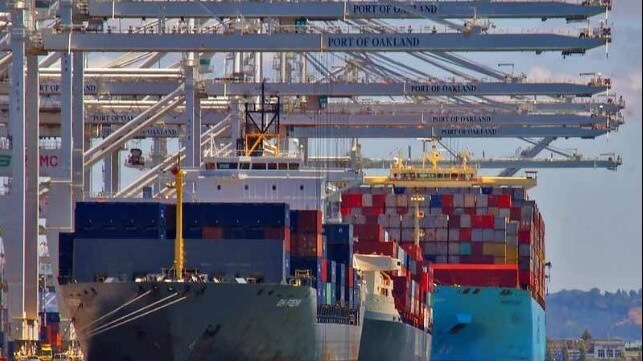Striking Truckers Halt Container Movement at the Port of Oakland

Independent truck drivers have essentially brought the Port of Oakland, California to a halt as their protest grows over a pending state law that they say will make it harder for them to continue as independent owner-operators of their trucks. The protests which began on Monday are expected to last throughout the week, with some drivers saying they are prepared to go weeks or even months until the California governor meets with them to address their concerns.
The drivers began their protest that the gates to the port at the beginning of the week and it is growing in size and number each day. On Wednesday, the largest of the terminal operators at the port, SSA, suspended work sending workers including longshoremen home while work at the other two terminals has also virtually stopped.
Members of the longshore unions, which officially support the pending new law as good for unions, have nonetheless begun to refuse to cross the picket lines. Unofficial reports said they feared for their safety if they attempted to cross the picket line, a position supported by reports from other truckers who said they were threatened with damage to their rigs if they attempt to enter the port.
At issue is a California state law passed in 2019 that seeks to reclassify how and when independent employees must be treated as employees versus independent contractors. California is estimated to have as many as 70,000 independent owner-operators driving trucks in and out of its ports and moving cargo. The law makes it harder for trucking companies that regularly hire the same drivers to classify them as independents.
The law has been held up in the courts through a series of legal challenges mostly by the California Trucking Association. It had been expected to go into effect in 2020 but remained suspended while the cases were being heard. Three weeks ago, the U.S. Supreme Court refused to hear what is believed to be the final challenge to the law cleared the way for California to proceed with enacting the legislation which is officially known as AB5 (Assembly Bill 5).
The truckers contend the law will force them to either seek full-time employment with a company or abandon independent driving. They argue that their costs for elements such as insurance would increase dramatically under the law as well as new permits that they would be required to have. They are demanding to meet with California Governor Gavin Newsom to air their grievances and look for ways to maintain their work under the new law.
So far, the Governor has not directly responded to the drivers. The Governor’s Office of Business and Economic Development Director Dee Dee Myers however responded to an inquiry from CNBC noting that the courts have rejected the opposition to the law and “it’s time to move forward, comply with the law and work together to create a fairer and more sustainable industry for all.”

that matters most
Get the latest maritime news delivered to your inbox daily.
The Port of Oakland is California’s third busiest port and the eighth busiest in the nation. Port officials acknowledged the driver’s frustration but said the blockade was threatening all of the businesses at the port and would further disrupt the supply chain. They noted that normally about 5,000 truckers work at the port daily and said the stoppage was impacting everything from Australian wine and meat, electronics, clothing, furniture, and toy imports. The stoppage comes just as the ports were preparing for the beginning of the peak shipping season as retailers typically build inventories ahead of the holiday selling season.
At least 15 containerships are reported to be waiting at the Port of Oakland with port officials saying they feared the carriers would begin diverting ships to other ports. The terminal operators highlighted that even if they could service the ships that their yards are quickly running out of space. Until they can get the trucks moving, they said the port simply has no more space for containers.
